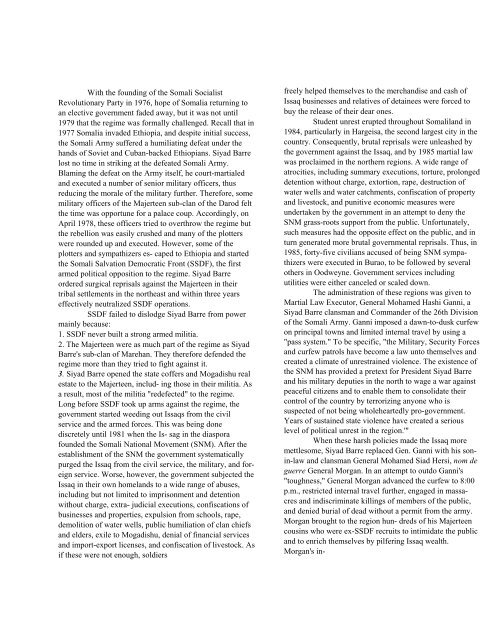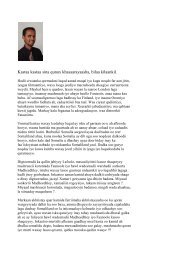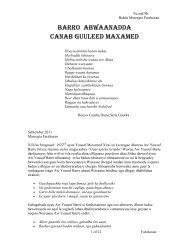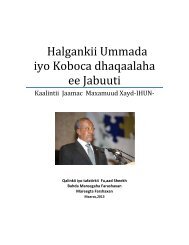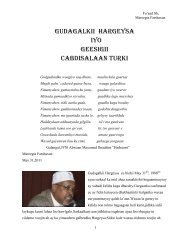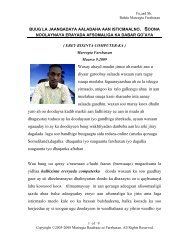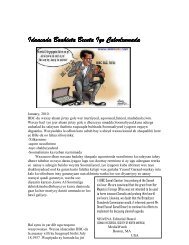Somalia: Illusory Political National-state - Farshaxan
Somalia: Illusory Political National-state - Farshaxan
Somalia: Illusory Political National-state - Farshaxan
You also want an ePaper? Increase the reach of your titles
YUMPU automatically turns print PDFs into web optimized ePapers that Google loves.
With the founding of the Somali Socialist<br />
Revolutionary Party in 1976, hope of <strong>Somalia</strong> returning to<br />
an elective government faded away, but it was not until<br />
1979 that the regime was formally challenged. Recall that in<br />
1977 <strong>Somalia</strong> invaded Ethiopia, and despite initial success,<br />
the Somali Army suffered a humiliating defeat under the<br />
hands of Soviet and Cuban-backed Ethiopians. Siyad Barre<br />
lost no time in striking at the defeated Somali Army.<br />
Blaming the defeat on the Army itself, he court-martialed<br />
and executed a number of senior military officers, thus<br />
reducing the morale of the military further. Therefore, some<br />
military officers of the Majerteen sub-clan of the Darod felt<br />
the time was opportune for a palace coup. Accordingly, on<br />
April 1978, these officers tried to overthrow the regime but<br />
the rebellion was easily crushed and many of the plotters<br />
were rounded up and executed. However, some of the<br />
plotters and sympathizers es- caped to Ethiopia and started<br />
the Somali Salvation Democratic Front (SSDF), the first<br />
armed political opposition to the regime. Siyad Barre<br />
ordered surgical reprisals against the Majerteen in their<br />
tribal settlements in the northeast and within three years<br />
effectively neutralized SSDF operations.<br />
SSDF failed to dislodge Siyad Barre from power<br />
mainly because:<br />
1. SSDF never built a strong armed militia.<br />
2. The Majerteen were as much part of the regime as Siyad<br />
Barre's sub-clan of Marehan. They therefore defended the<br />
regime more than they tried to fight against it.<br />
3. Siyad Barre opened the <strong>state</strong> coffers and Mogadishu real<br />
e<strong>state</strong> to the Majerteen, includ- ing those in their militia. As<br />
a result, most of the militia "redefected" to the regime.<br />
Long before SSDF took up arms against the regime, the<br />
government started weeding out Issaqs from the civil<br />
service and the armed forces. This was being done<br />
discretely until 1981 when the Is- sag in the diaspora<br />
founded the Somali <strong>National</strong> Movement (SNM). After the<br />
establishment of the SNM the government systematically<br />
purged the Issaq from the civil service, the military, and for-<br />
eign service. Worse, however, the government subjected the<br />
Issaq in their own homelands to a wide range of abuses,<br />
including but not limited to imprisonment and detention<br />
without charge, extra- judicial executions, confiscations of<br />
businesses and properties, expulsion from schools, rape,<br />
demolition of water wells, public humiliation of clan chiefs<br />
and elders, exile to Mogadishu, denial of financial services<br />
and import-export licenses, and confiscation of livestock. As<br />
if these were not enough, soldiers<br />
freely helped themselves to the merchandise and cash of<br />
Issaq businesses and relatives of detainees were forced to<br />
buy the release of their dear ones.<br />
Student unrest erupted throughout Somaliland in<br />
1984, particularly in Hargeisa, the second largest city in the<br />
country. Consequently, brutal reprisals were unleashed by<br />
the government against the Issaq, and by 1985 martial law<br />
was proclaimed in the northern regions. A wide range of<br />
atrocities, including summary executions, torture, prolonged<br />
detention without charge, extortion, rape, destruction of<br />
water wells and water catchments, confiscation of property<br />
and livestock, and punitive economic measures were<br />
undertaken by the government in an attempt to deny the<br />
SNM grass-roots support from the public. Unfortunately,<br />
such measures had the opposite effect on the public, and in<br />
turn generated more brutal governmental reprisals. Thus, in<br />
1985, forty-five civilians accused of being SNM sympa-<br />
thizers were executed in Burao, to be followed by several<br />
others in Oodweyne. Government services including<br />
utilities were either canceled or scaled down.<br />
The administration of these regions was given to<br />
Martial Law Executor, General Mohamed Hashi Ganni, a<br />
Siyad Barre clansman and Commander of the 26th Division<br />
of the Somali Army. Ganni imposed a dawn-to-dusk curfew<br />
on principal towns and limited internal travel by using a<br />
"pass system." To be specific, "the Military, Security Forces<br />
and curfew patrols have become a law unto themselves and<br />
created a climate of unrestrained violence. The existence of<br />
the SNM has provided a pretext for President Siyad Barre<br />
and his military deputies in the north to wage a war against<br />
peaceful citizens and to enable them to consolidate their<br />
control of the country by terrorizing anyone who is<br />
suspected of not being wholeheartedly pro-government.<br />
Years of sustained <strong>state</strong> violence have created a serious<br />
level of political unrest in the region.'"<br />
When these harsh policies made the Issaq more<br />
mettlesome, Siyad Barre replaced Gen. Ganni with his sonin-law<br />
and clansman General Mohamed Siad Hersi, nom de<br />
guerre General Morgan. In an attempt to outdo Ganni's<br />
"toughness," General Morgan advanced the curfew to 8:00<br />
p.m., restricted internal travel further, engaged in massa-<br />
cres and indiscriminate killings of members of the public,<br />
and denied burial of dead without a permit from the army.<br />
Morgan brought to the region hun- dreds of his Majerteen<br />
cousins who were ex-SSDF recruits to intimidate the public<br />
and to enrich themselves by pilfering Issaq wealth.<br />
Morgan's in-


